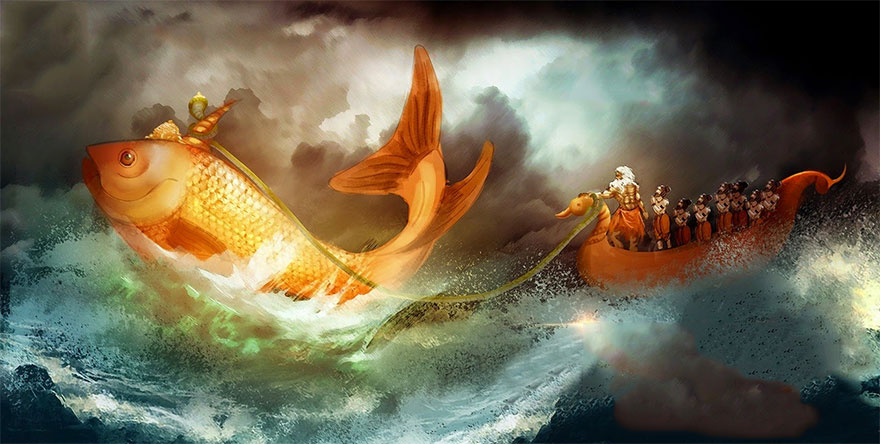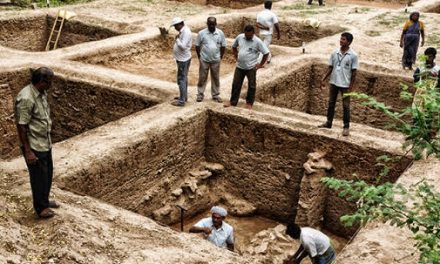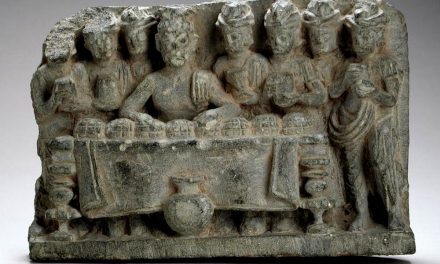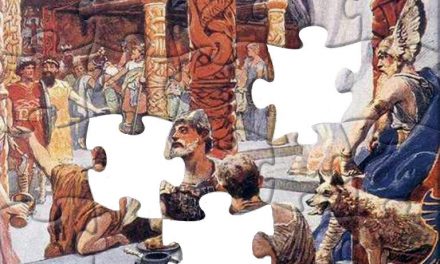Perhaps the most re-occuring tradition found around the world is that of a man, forewarned of a coming destruction (pralaya) by water, who escapes by boat, and preserves the human race. In the Vedic tradition he is known as Manu, the father of mankind.
The etymology of the word ‘man’ is ‘to think’ derived from the Sanskrit ‘manah’ for ‘the mind’. This is because, as descendants of Manu, our form of life is meant for higher levels of consciousness, above the base animalistic tendencies of eating, sleeping, mating, and defending.
In the Bhagavad Gita verse 4:1 we are told that Manu received the Divine instructions:
“The Blessed Lord said: I instructed this imperishable science of yoga to the sun-god, Vivasvan, and Vivasvan instructed it to Manu, the father of mankind, and Manu in turn instructed it to Iksvaku.”
The Vedic scriptures tell us that Manu is a position occupied for a period of time. At the end of each period a great destruction occurs and mankind must begin again. We are currently in the age of the 7th Manu – Vaivasvata Manu (Manu, the son of Vivasvan).
According to the Matsya Purana, Manu was meditating at the base of Mount Malaya performing his daily ablutions in a pond by his hermitage. In scooping up the water he caught a small fish and, not wanting to hurt him, placed the fish in a small container. Each day the fish grew larger and larger, and Manu transferred to ever larger containers, ponds, and rivers. Finally, Manu placed the fish in the ocean where it grew to an enormous size. The fish, an incarnation of Lord Visnu as Matsya, told Manu of a coming flood that would destroy the world.
Manu then took the Vedas along with the Saptarishis (Seven Sages) in a boat while the world was engulfed in waters. The Seven Sages are the manasa putra (mind born sons) of Lord Brahma, who rule over the seven solar systems that make up in Western astronomy the Big Dipper. These seven sages always point towards Dhruvaloka – the polestar.
There are literally hundreds of traditions from all around the world that speak of this global flood. In the Hawaiian tradition, Nuu was a man who escaped a great flood by going to the top of Maunakea on the Big Island. Likewise the Bible has the story of Noah and his ark resting on Mount Ararat. The Roman writer Tacitus tells us in his book ‘Germania’, that the Germans were descended from a progenitor called Mannus (though little else of their tradition is preserved).
What then was the highest knowledge that Manu preserved? We find the answer in Bhagavad Gita 18:65:
man-mana bhava mad-bhakto
mad-yaji mam namaskuru
mam evaisyasi satyam te
pratijane priyo ‘si me
“Always think of Me and become My devotee. Worship Me and offer your homage unto Me. Thus you will come to Me without fail. I promise you this because you are My very dear friend.”
This is the imperishable knowledge our forefather Manu received – man is to always think of the Blessed Lord.
Other Articles by Vaishnava Das:
Sweet Salt – The Story of How India Invented Sugar
India – The Land of Stolen Jewels
The Vedic People of Scandinavia
Soma – Elixir of the Gods
Manu and the Great Deluge
The Samurai: Protectors of the Cow
The Vedic People of Lithuania
The Legends of Tulasi In Christianity
The Mysterious Iron Deity made from a Meteor
Ancient Shiva Linga in Ireland















Early accounts of the Deluge equate Matsya with the Vedic deity Prajapati (who was identified with the creator god Brahma in post-Vedic era), contrary to Puranic story, wherein the fish was described to be an avatara of Lord Vishnu. The Shatapatha Brahmana is the earliest extant text to mention Matsya and the flood episode. It identifies the fish with Prajapati-Brahma.
The central characters are the fish (Matsya) and Vaivasvata Manu or Satyavrata who becomes the progenitor of mankind. In this version, Vaivasvata Manu or Satyavrata accidentally catches a small fish in his hands, while bathing. The fish is Matsya, who asks Vaivasvata Manu for life and protection; in return he promises to save Vaivasvata Manu from an impending flood; and Matsya knows exactly when this is to happen.
Vaivasvata Manu agrees to help; so Matsya tells him to place him in a jar of water, and keep him safe. When Matsya has outgrown the jar, Vaivasvata Manu must dig a pit, fill it with water and place him in it. When Matsya outgrows the pit, Vaivasvata Manu should transfer him to the ocean. By then, he will be big enough to survive; he will be indestructible, and will help Vaivasvata Manu survive the flood. Meanwhile, Vaivasvata Manu should build himself a boat. Vaivasvata Manu does exactly as the fish has instructed and eventually releases Matsya, now fully grown, into the ocean.
At the appointed time, the deluge comes; Vaivasvata Manu boards his boat and the waters rise to cover the earth. Vaivasvata Manu calls on Matsya for help. Matsya swims to the ship and Vaivasvata Manu ropes his vessel to the horn that has grown on Matsya’s head. Then Matsya tows the ship to the safety of the highest and driest ground, at the northern mountains (interpreted as the Himalayas).
Vaivasvata Manu ties the ship to a tree, disembarks, and then slowly descends the mountain along with the now subsiding water. Vaivasvata Manu finds himself the sole survivor on earth; all others have been washed away by the floods. Vaivasvata Manu then takes on the task of creating the new human race. Seeking procreation, he practices austerities and worships the gods by performing sacrifices, offering butter, milk, curds and ghee (clarified butter) to the sacrificial fire. Within a year, his prayers are answered; a beautiful woman called Shraddha appears. He marries her, and together they initiate the race of Manu.
I read chapter 4 in Gita. There is no such thing that Manu took any human to place where they can be saved? How many boats were there? How many people he saved? Was that flood only in India or on all the earth.
even in koran one finds it and manu = nooh
Dear Sohan, the story of Manu is in Srimad Bhagavatam and not in Srimad Bhagavad Geeta . Both are different books.
The idea is that to our mind, religion appears to be an artifact or object, something to be done by us and thus under our control. We cannot appreciate that religion is under the complete control of Krishna, and that “they think themselves the doers of actions which are in fact carried out by material nature” acting under the control of Krishna, or God.
So we should protect religion, as Satyavrata Maharaj protected Lord Matsya. However, the demands of religion become greater and greater (if we observe the imperatives dutifully), just as the demands of Matsya grew more onerous as He increased in size. Finally there was a return; by nurturing the Sanatana Dharma, we discover one day that only it can save us from the otherwise inescapable destruction of all that we believe to be meaningful.